Have you ever written a frustrated email to a support team of a company and waited days to get a response? Or have you been in a chatbot loop, repeating your issue over and over to a machine that simply does not get it? We have all experienced that. Customer service in the modern world of high tempo is a disaster when it is slow and ineffective. Customers will demand fast, correct and useful responses and failure to receive them will mean they will just walk away.
It is here that a groundbreaking technology enters the picture: AI Ticketing Systems.
No more cumbersome, exasperating support systems. Just imagine a world in which your support requests are comprehended immediately, dispatched to the most appropriate expert within a few seconds, and even resolved in some cases before a human agent even lays his or her eyes on them. This is not a science fiction, it is what thousands of businesses have already experienced by having the power of Artificial Intelligence in their customer support.
This is a complete guide that will take you through all you must know about AI ticketing systems. We will simplify complicated concepts to simple, easy to know concepts. You can learn a lot here whether you are a small business owner, support manager or simply interested in the future of technology. We will discuss the functionality of these, the features that transform the game, the best platforms available in the market, and how you can select the best platform to meet your needs.
How AI Ticketing Systems Work: The Magic Behind the Curtain
An AI ticketing system may appear to be magic. You email and it is sorted, ranked and sent to the right person. So how does it actually work? Visualize a simple analogy.
Consider your customer support inbox to be a giant, disorganized post office mailroom. Prior to AI, human employees were forced to open each envelope (ticket), read it, make their best guess as to what it was regarding, and take it to the appropriate department, e.g., Billing, Technical Support, or Returns. This makes everything slow, makes errors and ultimately becomes overwhelmed.
The mailroom is well run with AI. Every ticket is opened by a machine, which determines what it is about, and sends it to the corresponding team almost immediately. The procedure is quick, precise and is capable of handling a much larger number of tickets compared to people.
You recruit an extremely intelligent mailroom manager- an AI. This is how the AI will alter the way the office deals with mail:
- Data ingestion (collecting the mail): The AI gathers all of the messages on emails, social media DMs, web site chat, and contact forms into a central location. The source of the message does not matter, it goes into the same organized hub.
- Interpretation of the messages (Natural Language Processing – NLP): This is the essence of the intelligence of the AI. The AI reads and comprehends the human language in every ticket using Natural Language Processing (NLP). It can locate such important information as:
- Topic/Intent: Does the customer want a “refund”, a “password reset” or a “shipping delay”?
- Urgency: Is this an emergency situation of the system being down, or a mere feature inquiry?
- Sentiment: Is the customer satisfied, neutral or angry? Sentiment analysis assists the system to determine the emotional status of the customer.
- Sorting and assigning (automated routing & triage): The AI takes action when it knows what the ticket is. The AI will automatically route the ticket to the appropriate place using pre-determined rules instead of a human manually assigning it.
- An incident regarding a billing mistake is immediately forwarded to the Finance department.
- A furious tweet regarding a faulty product is marked as priority and is passed to a high-level support agent.
- Even a straightforward question such as, What are your business hours may not even require a human.
- Automatic assistance (Automation & Chatbots): The AI is able to solve a ticket independently in response to frequently asked questions. It uses a knowledge base (a library of help articles and frequently asked questions) to scan and give an immediate and accurate answer. This would typically occur via a chatbot powered by AI on your site or by responding automatically to an email with a link to the appropriate help article. This leaves human agents free to concentrate on issues that are complex and need a human touch.
- Training and updating (Machine Learning – ML): A really intelligent AI ticketing system does not merely do as it is told; it learns. With Machine Learning (ML), the system examines all interactions. The AI is trained by correction when a human agent re-categorizes a ticket. It becomes more understanding, routing and solving tickets with time, becoming even more valuable team members.
Top 10 AI Ticketing Systems in 2025
1. Zendesk
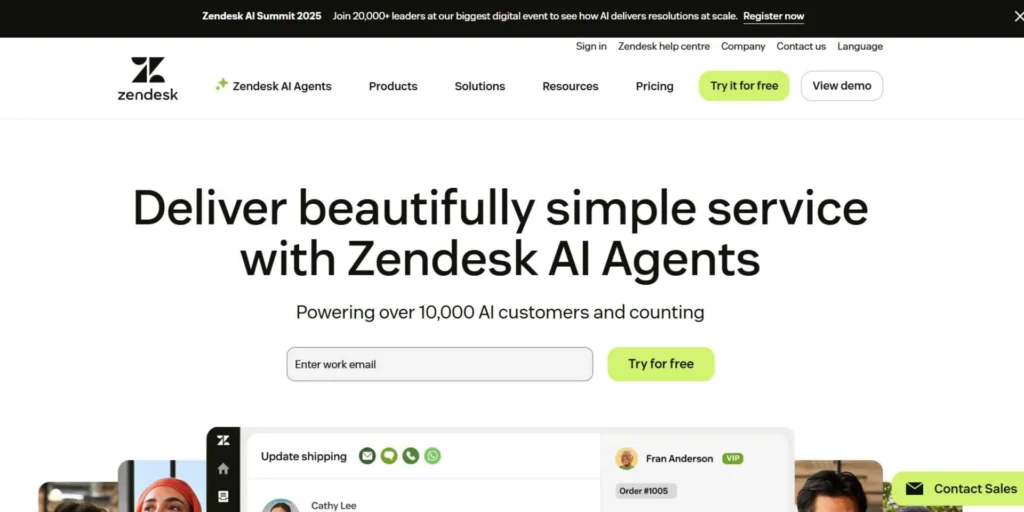
- Best for: Companies both big and small require an all-in-one, powerful and scalable customer service platform.
Zendesk can be considered the king of the customer support world and deservedly so. It provides a complete package of tools that can expand with the tiniest startup to the biggest business enterprise. It has strong AI features that are embedded into the whole platform, which is much more than just ticketing. It is one of the best AI ticketing systems. The AI of Zendesk can drive smart routing, contextual support of agents, and advanced chatbots that can deliver genuinely personalized self-service to the customers. It is excellent in consolidating all conversations across all channels into one and unified agent workspace. It is priced at a premium but offers a wealth of features, integrations, and powerful analytics to deliver an enormous amount of value to businesses that are serious about providing world-class, AI-powered customer experiences and support.
Key Features:
- Sophisticated AI to perform intelligent routing, triage, and categorization.
- Messaging and email bots that can be constructed without code and which are AI-powered.
- Content Cues which employ AI to recognize knowledge gaps in your knowledge base.
- Macro recommendations and sentiment.
Pricing: Prices begin at about $19 per agent/month (annual billing). More advanced AI is offered at higher plans.
Website: https://www.zendesk.com
2. Freshdesk
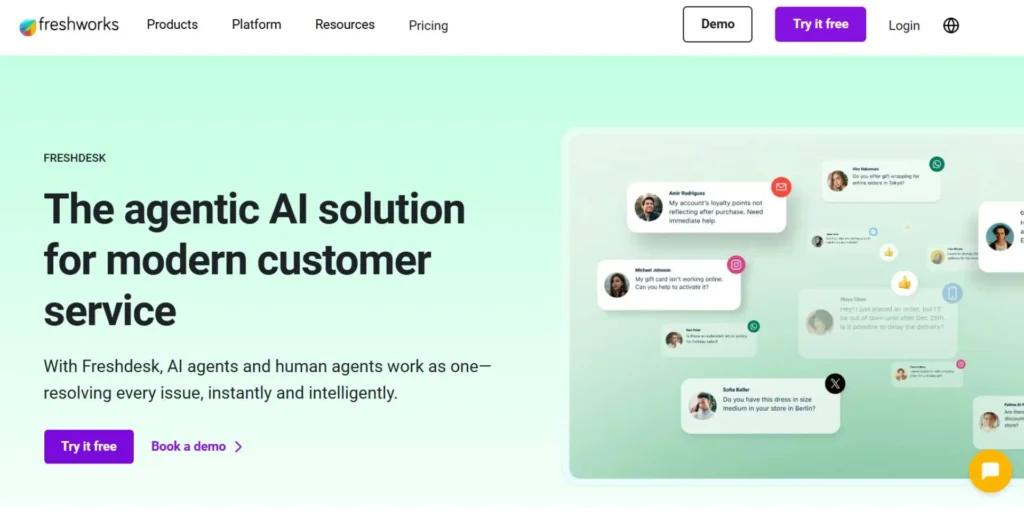
- Best for: Small and medium-sized businesses (SMBs) who desire an easy to use and feature-rich system with powerful artificial intelligence (AI).
Freshdesk has gained a reputation of being an easy to use, yet powerful alternative to more complicated enterprise products. The service includes its AI engine, called Freddy AI. Freddy automates routine work, proposes appropriate solutions to the agents, and communicates with the customers using smart chatbots. The easy-to-use interface is one of the most notable features of Freshdesk, as it allows teams to start working with it as soon as possible with minimum training.It is one of the best Ai ticketing systems. It provides a combination of strong automation, multi-channel (email, phone, chat, social media) and reasonable price. Freshdesk is a great option for SMBs that wish to take advantage of AI without having to spend a fortune or endure a massive learning curve.
Key Features:
- Freddy AI to issue tickets, detect thank-yous, and chat.
- Canned response and solution article suggestions based on AI.
- Monitoring of social media signals to identify urgent problems.
- Robotic Process Automation (RPA) would automate multi-step processes.
Pricing: Has a free plan of up to 10 agents. The cheapest paid plans with AI capabilities are about $15 per agent/month.
Website: https://www.freshworks.com/freshdesk
3. Zoho Desk
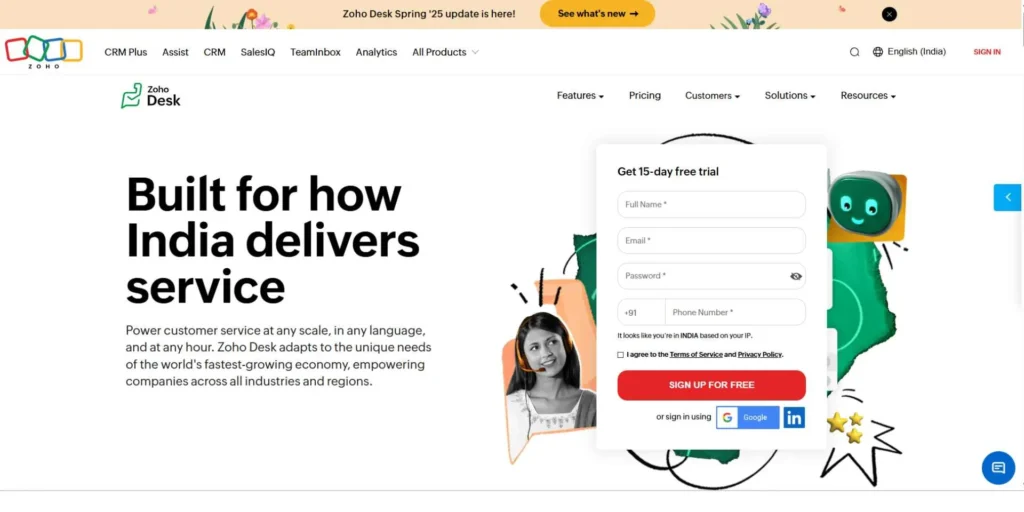
- Best for: Firms that are already using Zoho products and companies seeking a highly customizable AI solution with context.
Zoho Desk is one of the most important applications of the Zoho suite. Its greatest advantage is contextual AI, as it is able to integrate well with other Zoho products like Zoho CRM. That is, the AI assistant, Zia, can view all past purchases, interactions, and even sentiment score before an agent initiates a conversation. This amount of context is invaluable. Zia can also route tickets, analyze their sentiment and identify anomalies in ticket traffic. It is one of the best Ai ticketing systems. Zoho Desk is the most effective option and natural choice of AI-powered support to any business that is integrated into Zoho ecosystem.
Key features:
- Zia, an AI assistant by Zoho, to perform sentiment analysis, ticket tagging and agent alerts.
- Contextual AI that extracts information out of Zoho CRM and other applications.
- Ticket auto-tagging and Zia Voice to interact conversationally.
- Zia performance and accuracy dashboard.
Pricing: Has a free plan. AI-based paid plans are highly competitive, the cheapest one costs around $14 per agent/month.
Website: https://www.zoho.com/desk
4. Intercom
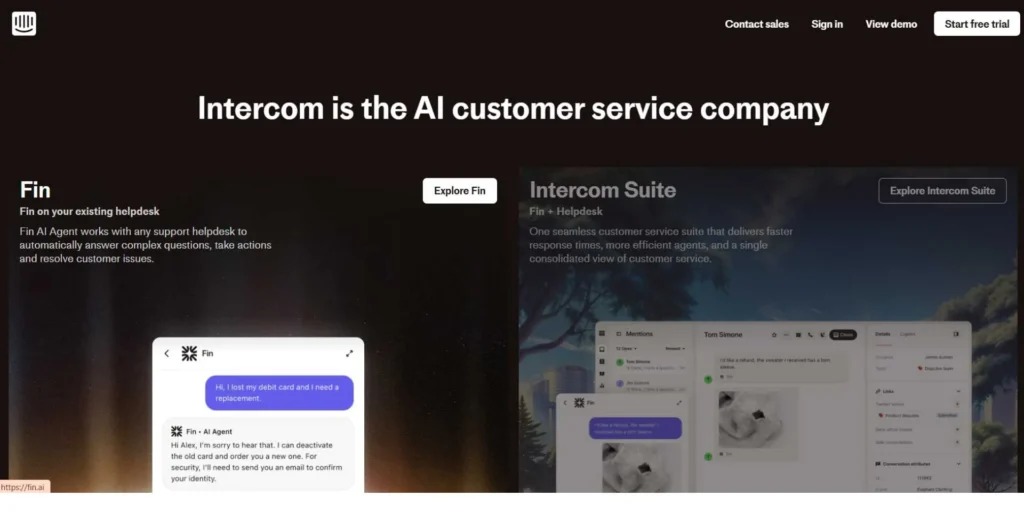
- Best for: Live chat and bots can be used by businesses that wish to connect with customers, sell, and provide support.
Intercom describes itself as a Conversational Relationship Platform. It is not just supportive, it assists in making interesting discussions. Its most popular aspect is its chat messenger that is text, image, file, and others. Intercom provides chatbots as well. It has an AI bot named Fin, which is capable of having in-depth conversations and resolving complicated problems by drawing on your knowledge base. The platform will actively welcome visitors to the site, qualify sales leads and offer immediate assistance. Although it supports email ticketing, its core competency is chats in real-time and powered by AI. Intercom is one of the most advanced alternatives in case your business relies on converting visitors into customers and providing them with immediate, chat-based assistance.
Key Features:
- Fin, a strong AI chatbot that is able to answer complicated customer questions.
- Automated inbox and conversation routing.
- Behaviour-driven proactive product tours and messages.
- Article recommendations and AI-based suggestions to the agents.
Pricing: It is on the high end. Pricing is between $74/month and is usually usage-based and feature-based.
Website: https://www.intercom.com
5. HubSpot Service Hub
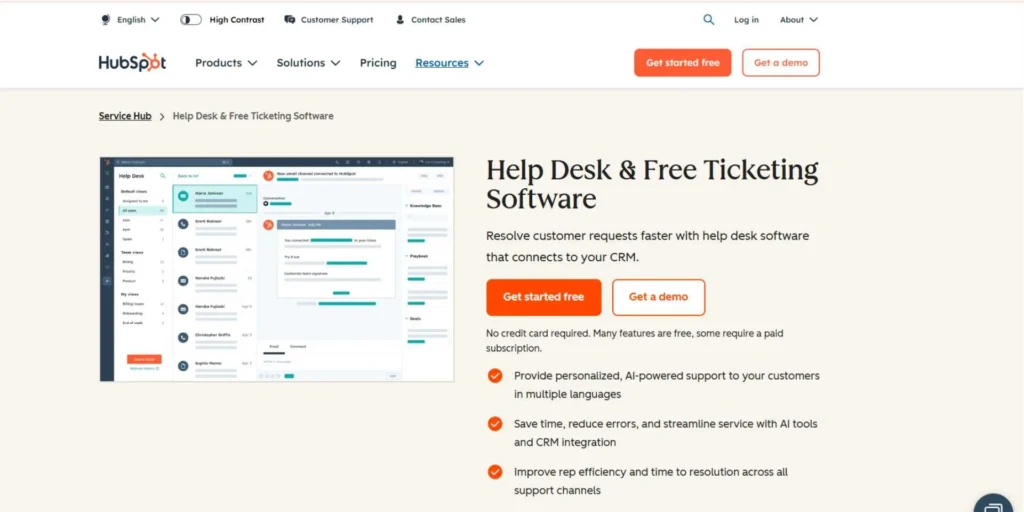
- Best for: Businesses that are marketing and sales oriented and wish to offer support in an integrated CRM system.
HubSpot is well known for its inbound marketing and sales software, and Service Hub is its customer service part. The greatest strength of Service Hub is that it is natively integrated with HubSpot CRM, Marketing Hub, and Sales Hub. This brings about one view of the entire customer journey. Its AI capabilities aim at making work more productive and more efficient. This also covers conversation intelligence tools that transcribe and analyze calls to provide insights, chatbots powered by AI, and ticket routing. Unless your company is already using HubSpot for marketing or sales, an easy way to develop a fully integrated, AI-powered customer experience is to add Service Hub to your existing platform, so that the experience is seamless, all the way through the first touchpoint to post-sale support.
Key Features:
- Call transcription and analysis conversation intelligence.
- Recommending articles in the content and knowledge base with the help of AI.
- Automation of the help desk in terms of ticket routing and escalation.
- Integration with the powerful CRM of HubSpot.
Pricing: Provides free tools. Service Hub has paid plans beginning at approximately $45/month per team.
Website: https://www.hubspot.com/products/service
6. Salesforce Service Cloud
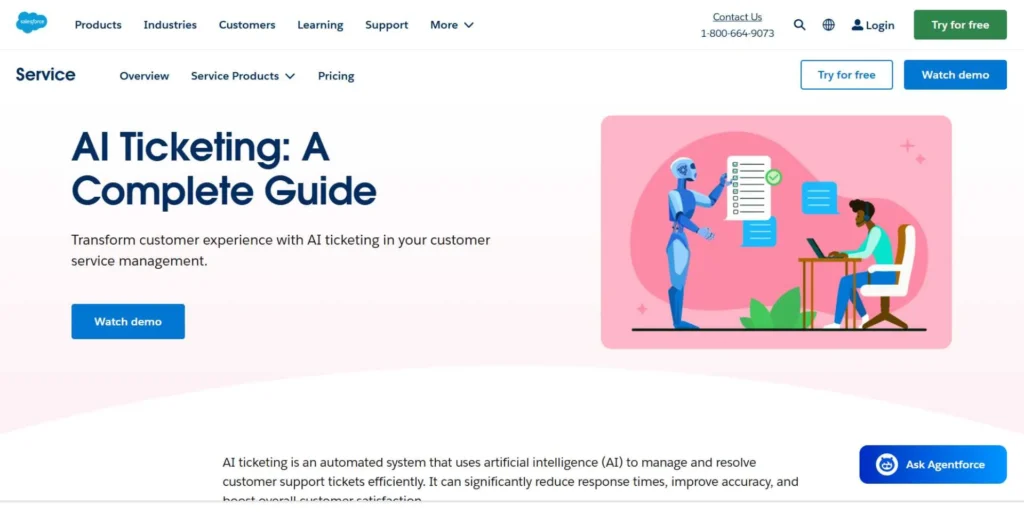
- Best for: Big companies and organizations who require a very powerful, customizable and data-driven service platform.
The Salesforce Service Cloud is an enterprise level application on the #1 CRM platform in the world. It has one of the most sophisticated artificial intelligence, called Einstein. Einstein is able to forecast customer needs, suggest next-best actions to agents and automate complex workflows. It has strong case classification and routing, which auto-populates ticket fields to save time of the agents. Service Cloud is complex and scalable, with in-depth analytics and infinite customization capabilities. Although it can be both complicated and costly to deploy, in organizations with large numbers of customers whose data and interactions must be managed, Salesforce Service Cloud with Einstein offers a level of AI-powered insight and automation that is unmatched.
Key Features:
- Einstein Case Classification to automatically route and classify tickets.
- Einstein Bots to have advanced and automated customer dialogues.
- Recommendations to surface relevant knowledge Einstein Article Recommendations.
- Next-best-action recommendations and predictive intelligence to agents.
Pricing: Enterprise, $25 dollars per user/month, and advanced AI at the higher plans.
Website: https://www.salesforce.com/products/service-cloud/
7. Gorgias

- Best for:
Gorgias is popular among e-commerce companies that operate on such platforms as Shopify, Magento, and BigCommerce. This helpdesk deals with e-commerce exclusively and solves the problems that are specific to it with the help of AI and automation. As an example, it can automatically respond to the question, “Where is my order” with live data in the store. It also labels tickets according to the intent, e.g. shipping-question or refund-request, and uses macros to resolve them in a single click. Gorgias is also highly integrated with social media and allows you to handle comments on ads and posts as support tickets. Gorgias is the obvious choice of any e-commerce brand that wants to automate support and generate sales.
Key Features:
- Integration with Shopify, Magento and BigCommerce to the deepest level of questions concerning orders.
- Intent and sentiment detection that is e-commerce specific using AI.
- Canned one-click answers (Macros) to frequently asked questions.
- Comment and ad moderation on social media.
Pricing: Depending on the volume of tickets, approximately $50/ month.
Website: https://www.gorgias.com
8. HappyFox
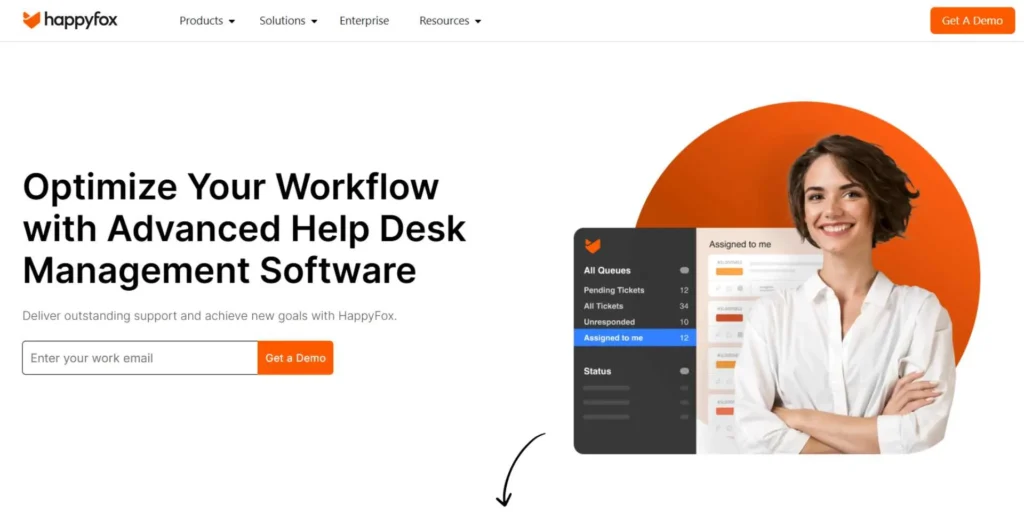
- Best for: HappyFox may be a good idea to test in case teams are seeking an intuitive, fast, and simple help-desk that has well-developed AI fundamentals.
HappyFox is simple and fast. It has an uncluttered interface that is user-friendly, and therefore onboarding agents is simple. It lacks the sprawling AI capabilities of an enterprise giant but its automation is practical and powerful. Smart rules automate the routing and management of tickets and canned actions are used to manage repetitive tasks. HappyFox also provides a self service portal where it is possible to deflect common questions. HappyFox has a reputation of being exceptionally customer friendly and reliable. It is an excellent option to teams that desire a no hassle, effective ticketing system that simply works. Its AI assists in optimizing the fundamental processes of ticketing without creating any unneeded complexity to the end user.
Key Features:
- Automation of Smart Rules in routing and management of tickets.
- AI-based chatbot that is connected with the knowledge base.
- Asset management and task management.
- Good user interface and ease of use.
Pricing: Pricing is agent based and begins at around $29 per agent/month.
Website: https://www.happyfox.com
9. Kustomer

- Best for: B2C businesses would like a single seamless customer timeline of customer interactions: prior purchases, visits to the web site, chat, and email.
Kustomer is customer-centered, not ticket-centered. It drags all interactions on a single timeline that teams can scroll down as a storyline. In this arrangement, agents are contextually aware. On top of that is AI that directs the conversation based on a customer’s history or value. The AI even tags the high-value chats as sales opportunities and forwards them to the correct agent.It is one of the best Ai ticketing systems. It also carries out sentiment analysis and recommends automated responses. The outstanding design of Kustomer is extremely powerful to modern direct-to-consumer (D2C) brands that prefer a holistic customer view over a ticket-focused approach.
Key Features:
- Timeline of customer-focused rather than single tickets.
- Customer-data- and chat-based AI-powered routing.
- Sentiment analysis on customer timeline.
- Kustomer IQ chatbots and deflection.
Pricing: Premium pricing, beginning at about $89 per user/month.
Website: https://www.kustomer.com
10. Jira Service Management
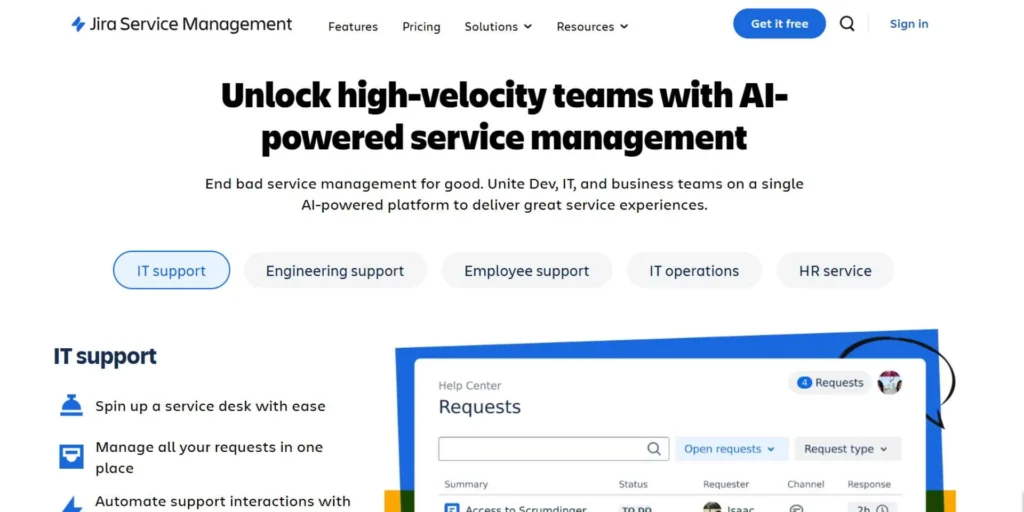
- Best for: These systems can be used when IT and development teams wish to connect support requests to their own working processes.
The majority can manage external customer support, but Jira Service Management is the best at internal IT and operations teams. It is developed by Atlassian and it seamlessly integrates with Jira Software, the most popular project-management tool among developers. An example of this is a bug reported by a customer that can be passed directly out of support and into an engineering trackable item. Its AI capabilities are meant to simplify IT service management (ITSM) by automatically categorizing tickets, recommending applicable knowledge articles in Confluence (Atlassian sister product) and directing requests to the appropriate IT personnel. Jira Service Management is the default choice of any tech company that seeks to reduce the divide between support and development.
Key Features:
- Native integration with Jira Software and Confluence, at a deeper level.
- Recommendations of related tickets and knowledge articles with AI.
- Routing and categorization of IT problems smoothly.
- High attention to ITSM and DevOps processes.
Pricing: Has a free plan up to 3 agents. The paid plans begin at about $21 per agent/month.
Website: https://www.atlassian.com/software/jira/service-management
Benefits of Using AI in Ticketing
Implementing AI ticketing systems is not only about acquiring new software, but a massive upgrade to your entire business. This is what the benefits will look like:
- Response times that are drastically faster: AI can instantly recognize, categorize, and even resolve a ticket, meaning that customers receive answers within minutes or seconds, rather than hours or days. This large speed-up increases customer satisfaction.
- 24-hour customer care: Self-service portals and AI chatbots do not rest. They will assist the customers during weekends, after hours, or on holidays, without incurring additional staffing expenses.
- Greater productivity and satisfaction of agents: AI frees human agents to work on challenging, high payoff problems by handling routine, tedious work. This renders them more productive and less burnout.
- Reduced expenses: AI minimizes the size of a large support staff to deal with basic inquiries. The use of AI also minimizes operation expenses by diverting typical tickets and helping the agents to solve issues faster.
- Evidence-based knowledge: AI is able to analyse massive amounts of data to identify patterns of product problems, holes in your support coverage, and other areas of improvement to better your products and services.
- Greater accuracy and consistency: Human mistakes are inevitable; AI directs all tickets and gives responses in the same manner, each and every time. This enhances accuracy and maintains answers consistent and in accordance with your brand.
Challenges & Limitations
AI ticketing systems may be quite useful, yet they cannot be a magic bullet. These are the pitfalls to watch out for:
- Implementation and Training: It requires time and effort to set up the system, to define automation rules and teach your staff at the beginning.
- Loss of the Human Touch: Over automation would render your support overly cold and impersonal. Apply AI to be efficient and retain humans in cases that require empathy and solving complex problems.
- AI is not flawless: AI may misinterpret context or fall in the classification. There should be constant monitoring and adjustment to ensure high levels of accuracy.
- Initial Cost: Although AI is cost-effective in the long term, smaller companies may find it costly to pay a subscription fee on an advanced AI platform.
Conclusion
The customer support is evolving rapidly, and AI ticketing system is the epicenter of this evolution. A tool that was available to only large tech companies is now available to any business that wants to remain ahead.
Such systems perform regular tasks, respond to inquiries immediately, and provide customer-service teams with detailed information about the needs of customers. In so doing, they transform support processes into faster, more focused and more efficient ones. They also allow you to shift support of cost center to growth and loyalty driver.
The initial step is to have a clear understanding of what you need, to look at the wonderful tools available and to make that leap of faith into smarter means of serving your customers. Customer service is already the future, and it is AI-powered.
FAQs
1. What is the main purpose of an AI ticketing system?
AI ticketing system is a self-managed system of customer support requests (tickets). Artificial Intelligence reads, classifies, routes and in many cases solves the tickets without assistance.
2. Will AI be able to fully substitute human support agents?
No. AI is an assistant to people, not a substitute. It performs routine, easy tasks, which allows human agents to work with complex, emotional, and high-value interactions, which demand empathy and critical thinking.
3. Are AI ticketing systems hard to install?
It may be different. The contemporary systems such as Freshdesk and HappyFox are simple to operate and can be installed within a short time. More technical enterprise systems such as Salesforce might require greater time and technical skills.
4. Is an AI ticketing system worth a small business?
Absolutely. Most of the platforms have cheap (or even free) plans. Even automating a small percentage of the support requests can save a small business a lot of time, make the customers happy and enable the team to concentrate on business expansion.
